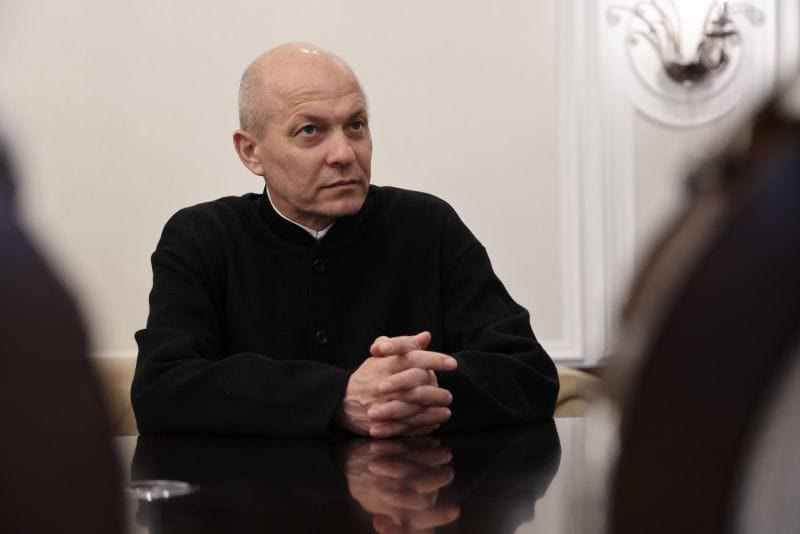
"My family never identified itself as 'Russian'."
I was born in Melitopol. I grew up in the village of Terpinnya in the Melitopol district of Zaporizhzhya. There were three brothers in our family. My childhood was spent doing farm work: as a shepherd, gardener, etc.
In September 1989, I began studying at a teacher training college in Krasnoarmiysk (now Pokrovsk). It was here that I first met native speakers of Ukrainian: many young people from Ternopil, Lviv and other western regions had come to study in eastern Ukraine during the Soviet era. Added to this were the first publications about the Ukrainian Sich Riflemen Legion, the study of the history of the Central Rada and the Ukrainian People's Republic, and stories from new friends about what the Ukrainian Insurgent Army was fighting for. On 1st May 1990, my group, the 11th (first year), raised a blue and yellow flag in the courtyard of the educational institution. My classmate Hayunov (unfortunately, I don't remember his name) did it. We bought the fabric for the flag together, and his mother sewed two flags. I took the second flag to my parents. Of course, the school director, the curator, and my classmate got into trouble, but we didn't regret it.
I started speaking Ukrainian in the summer of 1992 during my teaching practice in Altagyr (the village of Bohatyr) in the Zaporizhzhya Region. That's when I met my future wife Viktoriya, my first love. In December 1992, I found the Kalmius Palanka branch of the Ukrainian Cossacks in Donetsk and joined the Ukrainian Cossack movement, with which I still maintain ties.
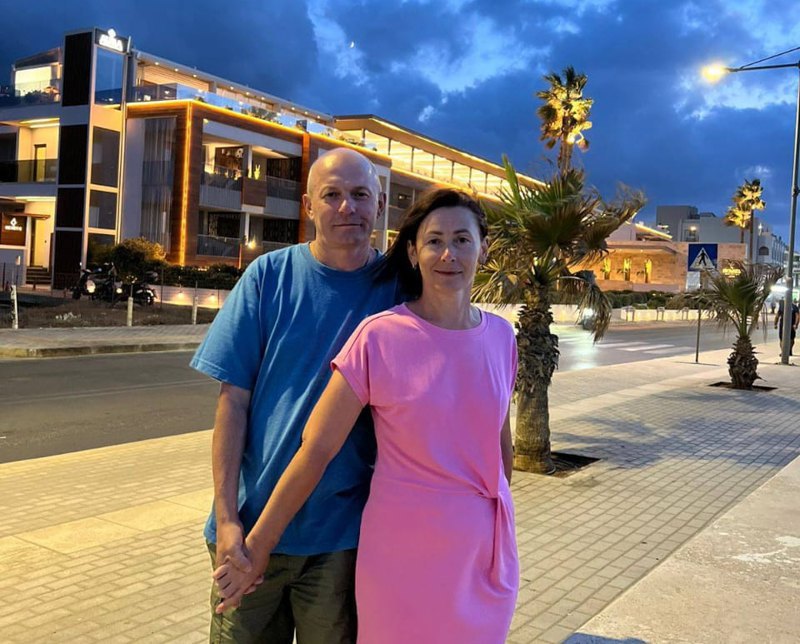
"Of the three thousand Crimean border guards from the occupied peninsula, 288 left."
During the days of the "Russian Spring" in Crimea, I was the deputy head of the Kerch mobile border guard post, part of the Simferopol border guard detachment (now the 79th border guard detachment), with the rank of second lieutenant. At that time, we did not even imagine that the Russians could pose a threat; we considered it nonsense. Mobile groups were sent to monitor the coastline from Kimmrik to Cape Chauda in order to detect Russian troops landing from large landing ships on the Crimean coast. The task was deliberately pointless, as we would not have been able to oppose them anyway. It only scattered our forces and exhausted our personnel. The time came when we were simply returned to our unit's location.
Our Kerch border guard unit, where my mobile outpost was located, surrendered to the Russian military. At night, the doors were opened on the orders of the unit commander, and FSB officers took control of the weapons storage room, communications equipment, special equipment and vehicles. Then the propaganda campaign against the personnel continued. During those days, the Kerch maritime border guards performed their first heroic deed: at night, they took all serviceable ships and boats across the ice of the Sea of Azov to the port of Berdyansk. The "agitators" came to me too — to ask me to serve "the people of Crimea."
The evening after the referendum, my commander, Captain Kramar, his deputy, Lieutenant Symonov, and I decided to leave the Crimean peninsula on our own, as it was already clear that it was lost: through the window of the garrison commander's apartment, we could constantly see how much Russian equipment and personnel were arriving in Crimea via the Crimea-Caucasus ferry crossing. Two contract soldiers from our garrison (out of 27 personnel) joined us.
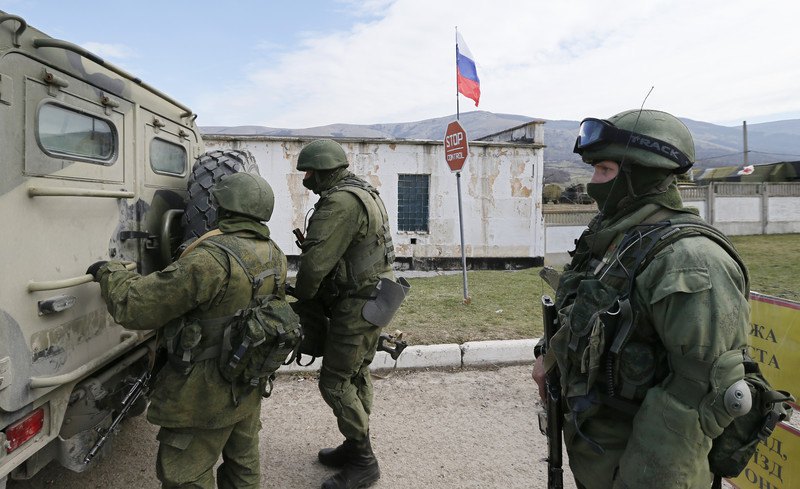
Out of the three thousand land border guards who served in the Autonomous Republic of Crimea, 288 people left the occupied peninsula.
—
"After falling into the Kalmius, I survived. Fifteen Azov soldiers drowned."
In 2019, I was diagnosed with a serious illness — a tumour in my right thigh bone. This was a turning point. My wife encouraged me to serve in the church, and I was fortunate to meet an experienced spiritual person, Father Uar, the then chaplain of the Mariupol Maritime Guard Unit. Bishop Serhiy, Metropolitan of Donetsk and Mariupol of the Orthodox Church of Ukraine, blessed me to serve as a sacristan. Everything else fell into place like pieces of a puzzle: military service, treatment, service in the church, seminary studies, and ordination as a deacon.
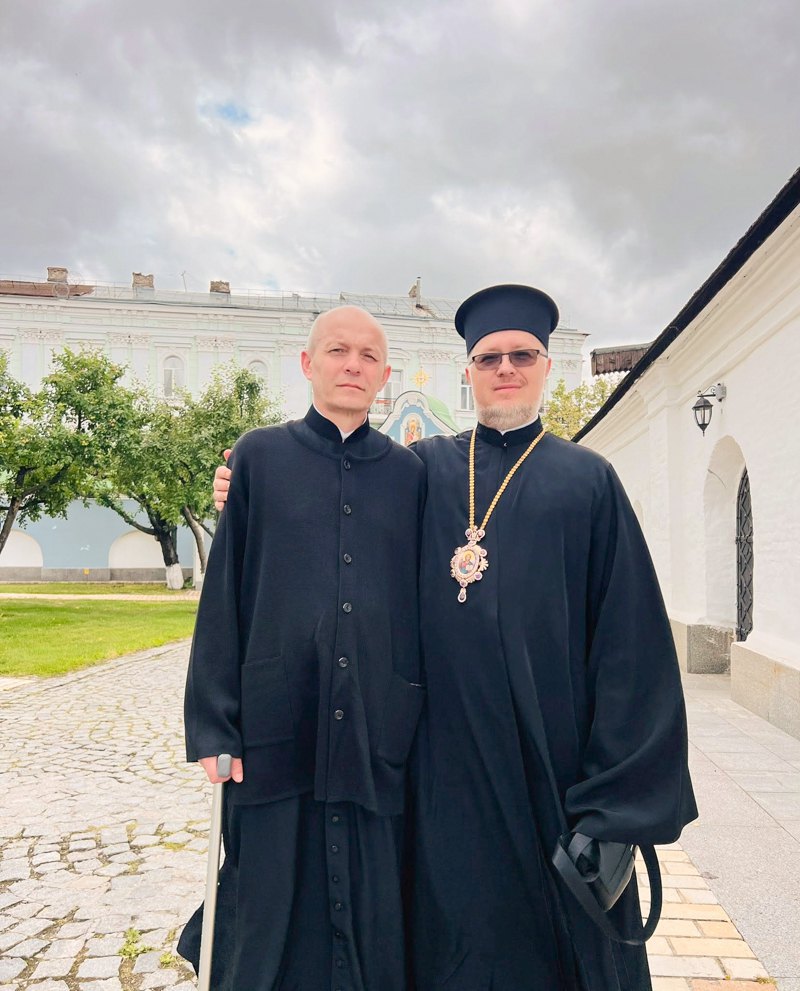
For me, the war began on 23 February after 10 p.m. with the command "base!" All personnel of the 23rd Marine Guard Detachment arrived at their deployment locations and armed themselves. At 4 a.m., the missile attack on Mariupol began, and the location of the Ukrainian Armed Forces' air defence battalion, where my son Andriy served, was immediately destroyed. I took over as duty officer at our Marine Guard Detachment headquarters. My wife did not want to listen to anything and refused to evacuate.
When the enemy ring around the city began to tighten, the command of the detachment was moved to the port, to the territory of the ship repair plant, where our border patrol boats were based.
The acting commander of the 23rd Marine Guard Detachment, then Captain 2nd Rank Petro Melnyk (Hero of Ukraine), assigned me the duties of field chaplain, as there were no clergymen in Mariupol. With the blessing of Bishop Serhiy, I provided spiritual care to the servicemen as best I could. My observation post, Barbarys, in the ship repair yard administration building, was a place of rehabilitation for those who were discouraged and panicked, who needed to recover somehow after severe concussions. I was on duty and prayed at the same time. I prayed for everyone. And everyone knew it.
I was not afraid of death: during the day, under fire, I went to our church and rang the bells, read prayers, and even managed to serve the Liturgy with the police chaplain. At night, I was on duty at the observation post. But that does not mean that I was reckless.
Later, I found myself at the Hora position, where I baptised Ivan, an Azov scout, looked into the eyes of the enemy and death, received my baptism of fire, and took part in the capture of two DNR fighters with two AKs.
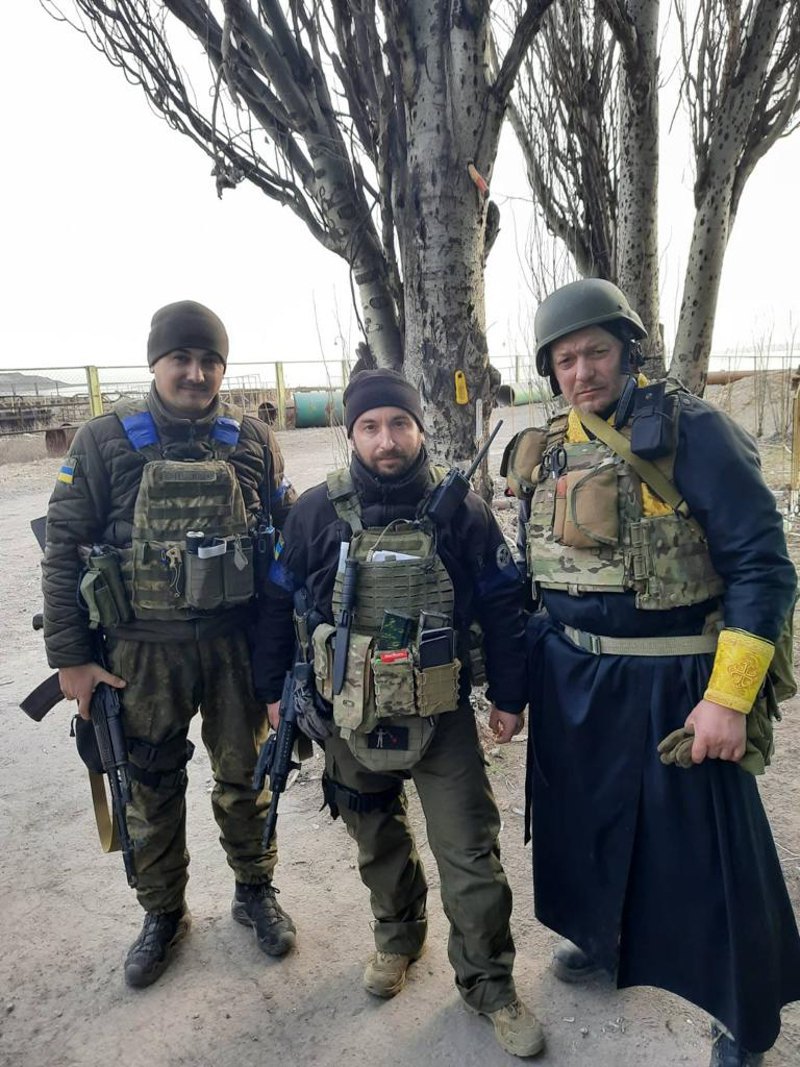
"Redis said we would fight to the last bullet and the last drop of water."
Then there was a breakthrough by the defence forces of the Prymorskyy district of the city at the Azovstal plant: I was in a group of soldiers on the armoured personnel carrier Bucephalus, which managed to break through the bridge over the Kalmius, but overturned into the water as a result of shelling. I fell under the armoured personnel carrier and suffered a contusion on the right side of my body — my right arm swelled up and stopped responding. I was the 300th soldier for almost the entire time we defended the plant. Everyone who was with me on the armoured vehicle survived, the driver and the second driver also survived, but the Azov soldiers who were in the landing compartment drowned, there were 14-15 of them.
At the factory, I continued my daily prayers and spiritual care for the soldiers as much as I could. Many guys brought me notes asking me to pray for their loved ones.
The realisation that we were doomed came immediately when we found ourselves in the factory, where it was dark, cold and hungry. I understood that this was the beginning of the end. At the beginning of the defence, the bishop insisted that I burn my vestments and prayer books, leave the city through the occupiers' filtration points without revealing my identity, and make my way to Ukraine. I couldn't bring myself to do it, but the Lord took everything from me himself: my vestments, liturgical books, church wine, myrrh, prosphora — everything sank along with the equipment in the Kalmius. All that remained was a 2014 edition of the Ukrainian Warrior's Prayer Book, which was in my breast pocket along with my documents.
Certain individuals from our military formations also contributed to the failure of the defence. Keeping their own soldiers half-starved and misleading the defence leadership about the availability of resources, the officials responsible for supplying food to the personnel allowed the enemy to capture more than 10 tonnes of food.
—
Our detachment, or what was left of it — about 100 people — was based in the basement of the third level of the Dzerelo mine under workshop 3600, together with soldiers from Azov, marines, and members of the territorial defence forces.
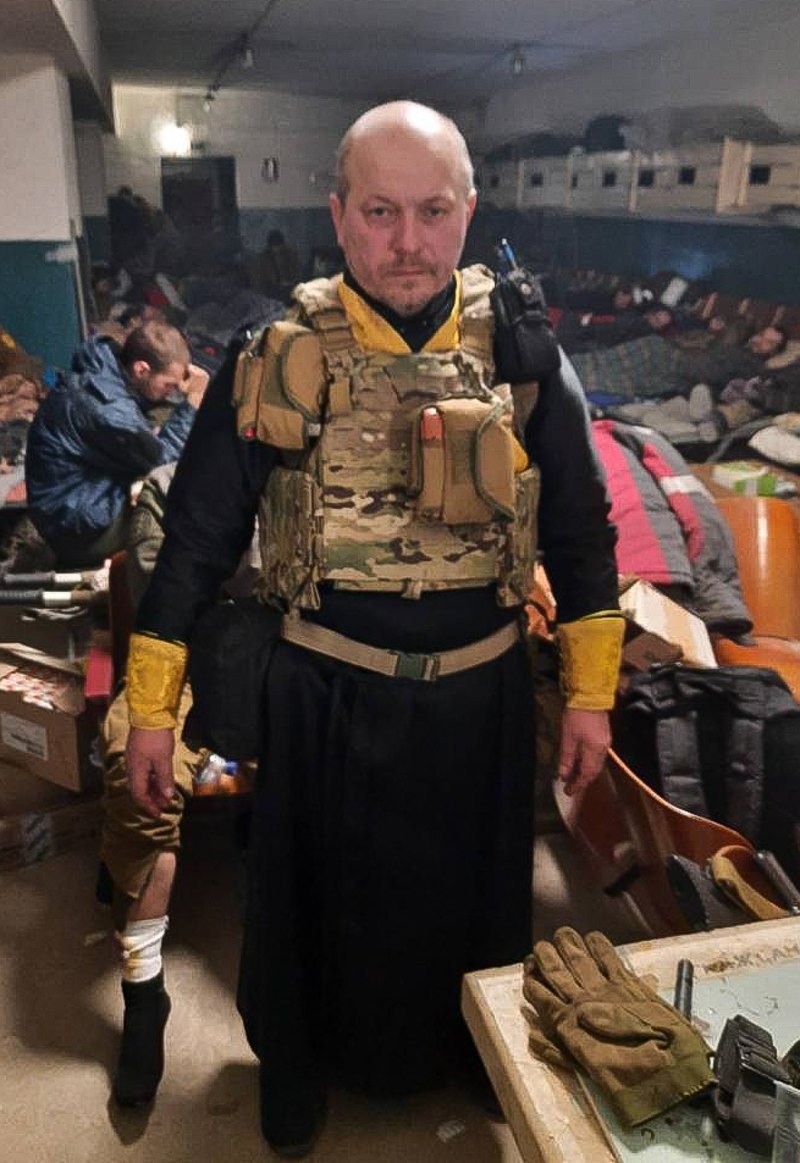
During our first days at the factory, on 15–16 April, Redis (Denys Prokopenko) said that we would fight to the last bullet and the last drop of water.
No one thought about voluntarily surrendering, but everyone understood that a deadly outcome was inevitable: after a month at the factory, all the workshops and buildings were destroyed, and we were preparing for the Russian Guard to smoke us out and drive us out of the basement — this was reported in the Russian news. Repeatedly in the basement of Dzherelo, we were plunged into a cement fog as a result of shelling and bombing, and we were also bothered by a five-centimetre layer of graphite dust on the floor — we constantly raked it into corners and poured dirty water on it when it appeared. I coughed up this dust all summer in Olenivka.
The temperature in the basement did not exceed 15 degrees, it was damp and dim, we were hungry... But no one lost their humanity, and that gave us the strength to hold on. It was important to stay in touch with family and Ukraine. My phone got wet in Kalmius and didn't work, but someone always helped me get in touch with my family. We had a connection through Azov's StarLink (we lost ours during the breakout to the factory) and agreed to talk for up to 10 minutes per person every three days. We could warm up a little by the fire and dry our clothes on the exhaust of the diesel generator. As 300 was constantly in the basement, and the guys were taking up positions: Beton, Shlakha, etc. — many died…
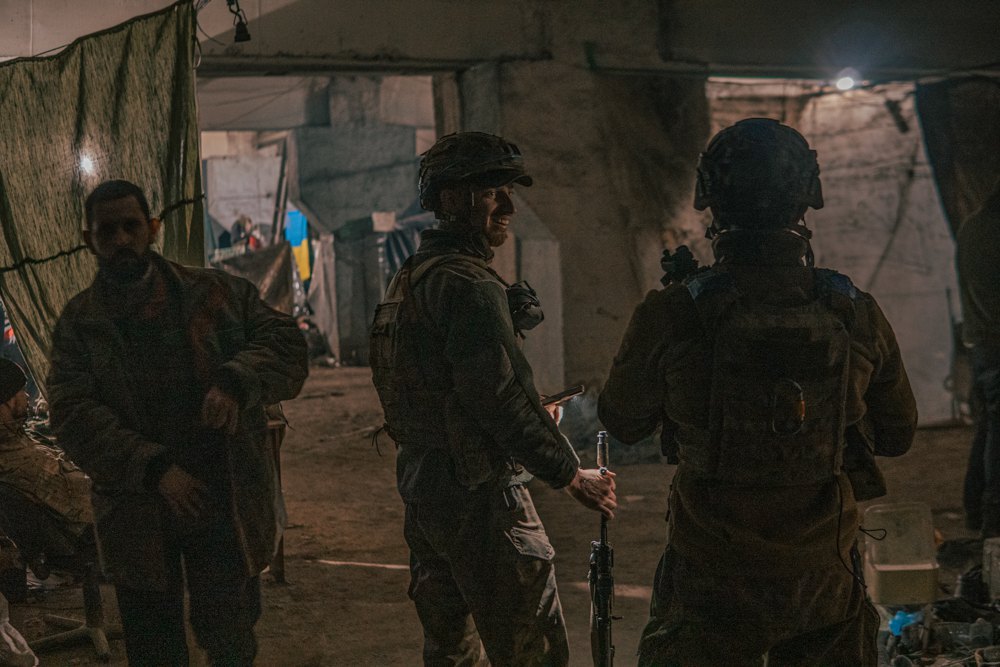
"Many guys did not surrender. Their fate is unknown."
On 15 May, Redis came to us at Dzherelo and told us about the "honourable captivity": a camp colony in Olenivka, humane treatment by the enemy, an agreement that we would be "served" by the Federal Penitentiary Service of the Russian Federation, not the "DPR", and therefore there would be no abuse. They promised normal living conditions, beds, showers, three meals a day, the presence of the Red Cross in the colony, and contact with relatives. The task was to survive, and, they said, in three or four months we would be exchanged and returned to territory controlled by Ukraine. I did not believe these fairy tales, knowing that the enemy is very cruel. But between life and death, a person chooses life. However, quite a few guys did not go into captivity: they took weapons, food and went their own way. Their fate, unfortunately, is unknown. Although they told about a soldier who left Mariupol on his own.
On 17 May, on the orders of the acting commander of the detachment, I left the factory as part of a group of soldiers from various branches of the armed forces, handed over my AK-74 assault rifle (we had previously bent all the barrels) to an enemy truck, and was inspected by a Dagestani (who was not aggressive, his face was not covered, and you could sense he was glad that the fighting was over), introduced myself on video to an Russian special services officer (his face was covered with a balaclava, he wore a cap) and got on a bus from Rostov (there were many advertisements from this city in the bus). The Dagestani who was escorting us was frightened and jerked the bolt several times, causing bullets to fly around the cabin. It was clear that he was not himself and was panicking in fear of the ‘Nazis.’ We travelled all night to Olenivka and spent half the night standing under a barbed wire fence. In the morning, there was a reception in barracks 7–8. For those from the factory, it was humane, without beatings, but morally humiliating, with a search that left them completely naked, and the confiscation of their belongings and all hygiene products.
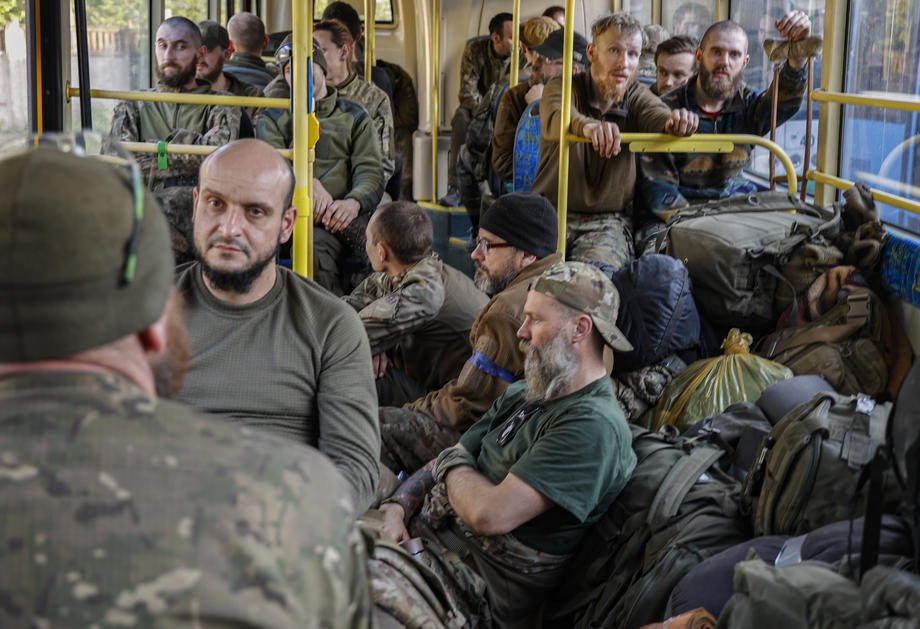
None of the enemy's promises were fulfilled. There was no mass torture at that time, but people were tortured during interrogations and in solitary confinement. When moving outside the barracks, you could get kicked simply because the guard or special forces officer was in a bad mood. There was no drinking water, sewage system, beds or bedding in the barracks. The food was very poor and bland, without any fat, but we were happy to have ordinary bread, as we had forgotten about it during the defence of the city.
"After the terrorist attack in Olenivka, DNR journalists laid out fragments of HIMARS."
I remember well the night when the boys were killed in barrack 200. I woke up on the first floor of the barracks and saw a BM-21 Grad launcher firing from under the colony fence towards the Kurakhivska Thermal Power Plant, where the front line was. We heard heavy explosions, but we knew it wasn't us, so we weren't worried. In the morning, we found out that during the night, the roof of the new barracks in the industrial zone had been hit. Then the guys from our barracks' work group told us how they had cleared away the bodies of the Azov soldiers and seen how DNR journalists had laid out the remains of American HIMARS shells, not caring that Ukrainian prisoners could see them.
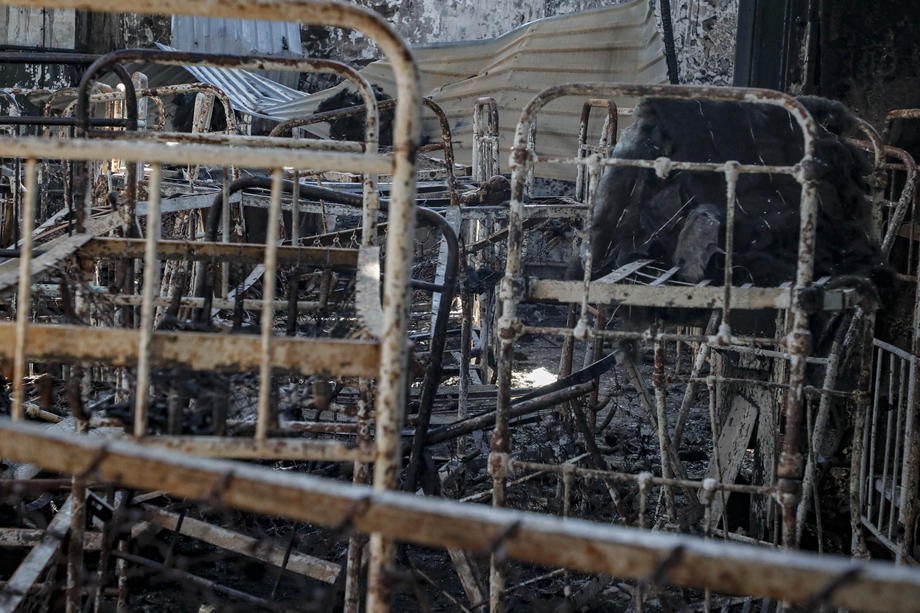
A military parish was formed in the barracks of the maritime border guards, and everyone who needed it joined us. Our guards brought Bibles and a large prayer book from the prison chapel of the Ukrainian Orthodox Church of the Moscow Patriarchate, which had no priest. With the blessing of Bishop Serhiy, when I surrendered, I did not mention that the priest had been captured as an officer of the 23rd Marine Guard Detachment. From the first interrogation, I was faced with agitation to switch to the enemy side, which I immediately refused, and those young Russian officers who interrogated me took my passport and service ID, said that it would be difficult for me in captivity, and warned that not everyone could endure it.
They returned my 2014 edition soldier's prayer book, which contained examples of God's power during the Maydan.
We prayed every day. At first, there were two or three people with us, but then, despite the fact that on 22 May, people began to be transferred from our barracks (we hoped that these were exchanges), more and more people joined us in prayer. When they were sent away, our brothers asked us to pray for them.
My parish was growing. In the barracks, I baptised two soldiers who expressed a desire to accept Christ into their hearts. For me, this was another revelation of God's providence and an answer to my inner self as to why I found myself at war and remained alive. One guy was from a Protestant family, but he accepted the Orthodox rite. In the summer, when it was warm and the barracks were overcrowded, we prayed in the courtyard adjacent to the barracks, under a large wild apricot tree; our guards (especially the special forces) were emotionally shocked when they saw the "Nazis" praying: "These murderers are praying?!!"
What was all too symbolic for me in this hellhole was that every search, where they forced you to undress and sit naked, took place near ‘Golgotha’: three wooden crosses with crucifixions of thieves and Jesus Christ, made of wood and almost life-size.
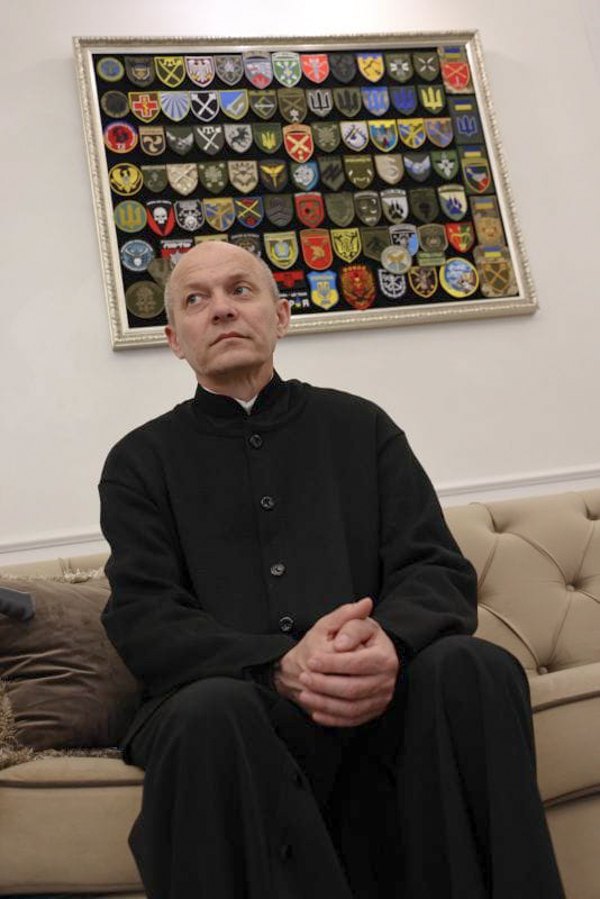
"I saw senior officers unable to withstand starvation torture."
The most severe torture in captivity is starvation. Years of living in hunger wears down the psyche no less than other forms of torture. Because of hunger, the boys defected to the enemy — first in Olenivka, to the so-called volunteer battalion of the "DPR" named after B. Khmelnytskyy, then in Kamyshin. I saw senior officers who initially volunteered for farm work (of course, for food) to help the Russian prisoners who served us, and then renounced their Ukrainian citizenship.
The next stage was Kamyshin in the Volgograd Region. We were transported in Kamaz trucks with our eyes covered with tape and our hands tied, then flown on an Il-76, then transported in a police van and received. Each prisoner, upon exiting the police van, was led into a corridor lined with special forces soldiers who beat the bound prisoners wherever they wanted: I was quickly knocked off my feet — I fell to my knees, and one of the guards grabbed me by the collar of my sweater and pulled me along. I didn't have the strength to get up, and when he "delivered" me, I received powerful blows with heavy, sharp shoes to my liver and spleen, then with a stun gun to my back.
Then I stood on my knees on fine gravel for over 12 hours: my knees were covered in blood and took over three months to heal. During the reception, I avoided severe torture thanks to a gift from my wife: when Mother Viktoriya said goodbye to me in Mariupol (she was leaving the city on foot for Zaporizhzhya), she gave me an icon of Saint Motrona of Moscow. The guard asked me what was in my pockets. I replied that I had a prayer book and icons of Motrona of Moscow and the Holy Family of Christ. I saw the surprised eyes of the guard, who did not know what to say to me next. Yes, I did not escape humiliation and beatings, but compared to others, it was almost symbolic. A week and a half later, Senior Officer 1 of the border guard detachment, Andriy Remizov, fell into a coma and died from the beatings he received during the reception.
According to the testimony of Azov servicemen, about 20 prisoners were beaten to death during the reception in Taganrog.
—
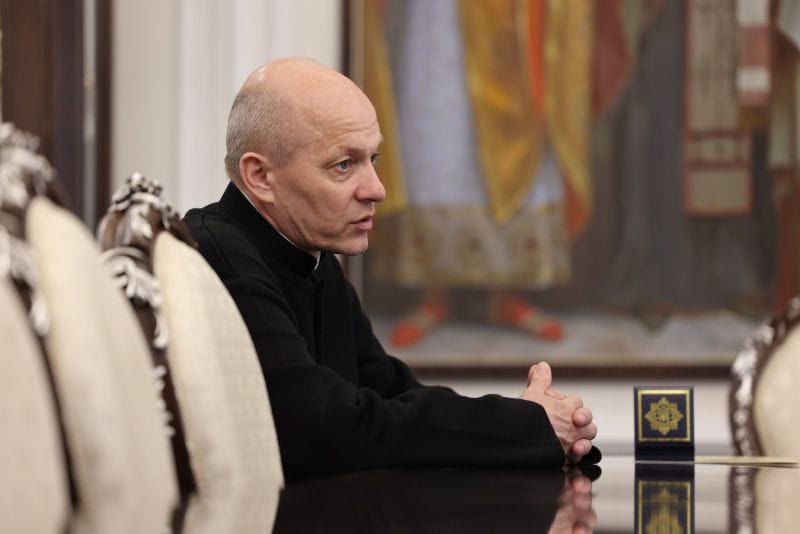
"We were not given socks or underwear. It was a form of humiliation of human dignity."
We faced an information vacuum, a lack of even Russian news, constant searches of our cells accompanied by beatings and humiliation, learning the Russian anthem and songs, exhausting physical exercises, endless squats, six sets of exercises a day; disinfection with decontamination tablets in water without ventilation of the cell, weekly abuse in the bathhouse, abuse while moving to the exercise yard... The lack of socks and underwear was also a form of humiliation of human dignity. Underwear appeared at the end of June 2024, during the so-called Moscow inspection, and summer socks were issued on 28 December 2024, before the delivery of letters from relatives: under the camera, from the hands of some human rights representative from the State Duma of the Russian Federation.
A separate form of torture was interrogation by the operational unit of the pre-trial detention centre, using electric shocks. Investigator Anatoliy, with a hoarse, smoky voice, interrogated the boys together with another investigator. During these interrogations, our prisoners were subjected to TA-57, i.e. electric current from a hand-operated dynamo, which was turned by sadistic investigators. For some time, I was in a cell next to this "drinking hall" and heard the screams of the boys who were being tortured. Among themselves, the Russians (both prisoners and FSB officers) called this room a prayer room, because the boys constantly shouted: "I beg you, chief!" For some reason, I was not tortured in this way, but they used a stun gun on me.
In the summer of 2023, the ICRC visited SIZO-2. It was a complete farce, a theatre. For four days, they taught us to walk with our heads bowed, and did not require us to sing the anthem or their stupid songs. We were strictly forbidden to complain about anything or talk about prison life, receive or ask for (write) letters to our relatives. We just had to assure them: "I'm fine, I'm waiting for the exchange." We were lucky that they didn't "get to us". Some were not so lucky — and after 6 p.m., when all outsiders had left the detention centre, we heard our prisoners being beaten with rubber batons in the corridor for violating the instructions on how to behave with representatives of the ICRC. The only positive thing was that books by world classics were distributed in the cells and chess sets were issued for a day, in turn between the cells.
All my guys from barracks 7–8 in Olenivka knew that I was a chaplain, and it was a true miracle of God that no one reported me to the guards during three years of captivity. Yes, in Kamyshin we found ourselves in different circumstances, yes, there are no unbelievers in war, but not all people believe in God. Once the danger recedes, people quickly forget that they turned to the Heavenly Powers for help, even in prison.
My cellmates asked me to read the prayers I remembered, first on Sundays, then individually, asking me to teach them the prayers; I told them the lives of the saints I knew: Clement of Rome, Luke of Crimea, the biography of Karol Wojtyla (John Paul II), the history of the Old and New Testaments, the history of the Ukrainian Church and the history of Ukraine.
"In the spring of 2025, I learned for the first time that Ukraine had not perished and was fighting."
Three times I felt the breath of the Lord above me: in the operating room, where I underwent two operations for a serious illness; at the altar and the sacrificial table during the Divine Liturgy; and at a combat position. Repeatedly, after my prayers to the Lord, the artillery shelling stopped. In captivity, I often turned in my thoughts to my favourite holy confessor, Luke of Crimea, and in response I saw his bright icons in my dreams, and these dreams gave me strength.
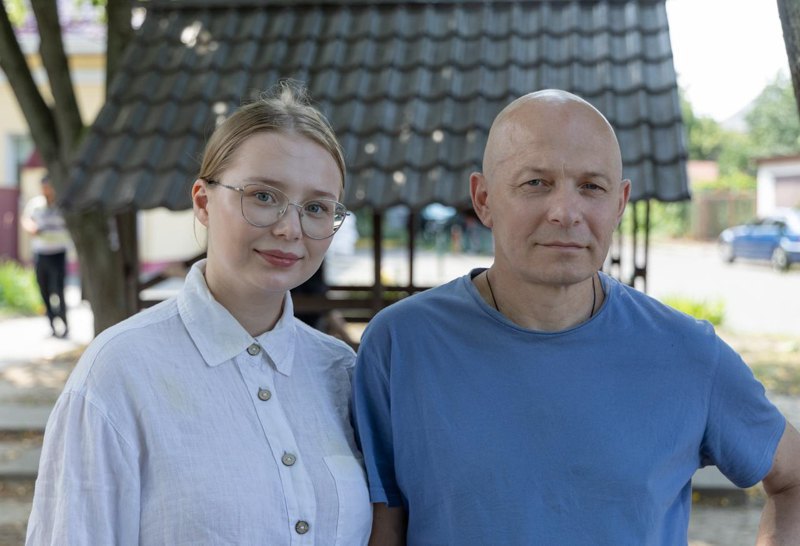
While defending the plant, I discovered that my wife Viktoriya and daughter Yelyzaveta had managed to get to Zaporizhzhya. On 28 December 2024, in the detention centre, I received a letter from Viktoriya‘s mother in Germany through the Russian State Duma's human rights representative, informing me that all my relatives were alive and well. My relatives received a message from me once through intermediaries, from an underground telephone in Olenivka. The next "communication session" was an exchange that I did not attend, but while I was in the cage, an officer from the 23rd Marine Guard Detachment recognised my voice and told my family that I was alive. Then I was brought back before boarding the police van because they had confused me with someone with the same surname from the third floor.
At the end of November 2024, a priest from the Russian Orthodox Church unexpectedly visited us, asked if everyone was baptised and Orthodox, and blessed us with a wooden cross, placing it on the heads of the prisoners.
On 19 January 2025, the head of the detention centre went around, entering each cell and announcing that Russia was ready to exchange all Ukrainian prisoners for all of them, but Ukraine was not ready, that when the weather got warmer, walks would begin, food would improve, and he asked if the staff of the institution was offending us. From that day on, during meals, they turned on the first channel of Russian radio, conducted morning body searches (in underwear), and stopped beating us for no reason, beating us only "for a reason." From February 2025, in addition to books, cheap copies of the Gospel were distributed in the cells.
By God's will, in the spring of 2025, I found myself in a cell with Ukrainians who had been captured much later than I had. From them, I learned that Ukraine was fighting and had not perished. For the first time during my captivity, I ate an egg (blessed) and a tiny piece of Easter cake on Easter 2025.
I did not become embittered towards my tormentors — God's judgment will be carried out on them during their earthly lives. But my psyche is not made of iron, and the Russians I have met abroad, in Europe and Turkey, irritate me greatly. To me, they are all Nazis (except for those who have publicly renounced Putin). For them, Ukrainians, like Jews once were for Hitler, have no right to exist, let alone have their own state.
For us, this war is a war for survival. For the Russian Federation, it is a war to preserve its empire, because without Ukraine, this empire is doomed to collapse.
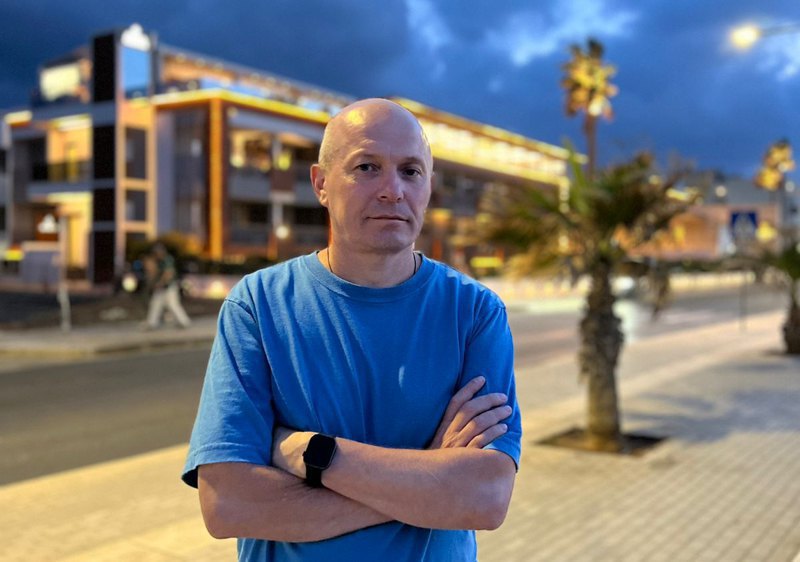
***
Photos were provided by Vasyl Fedorenko.








